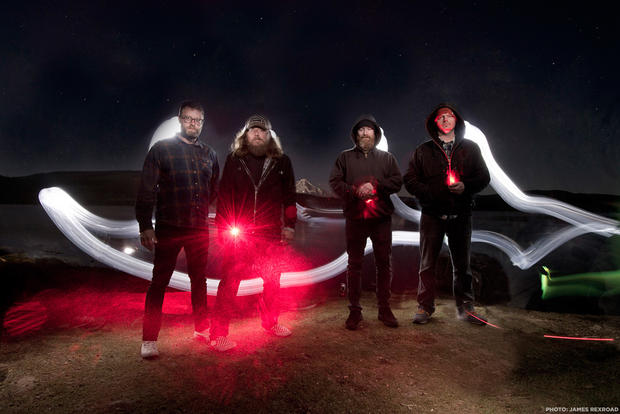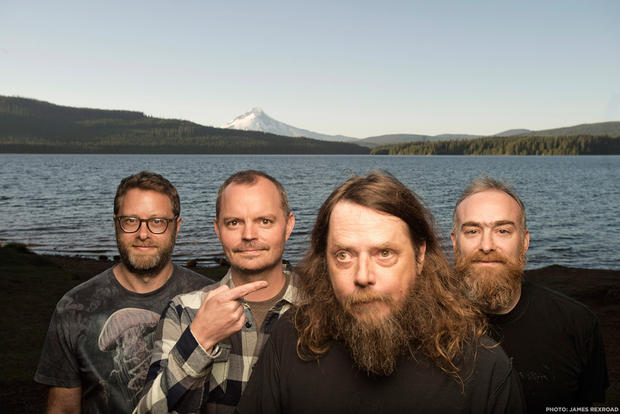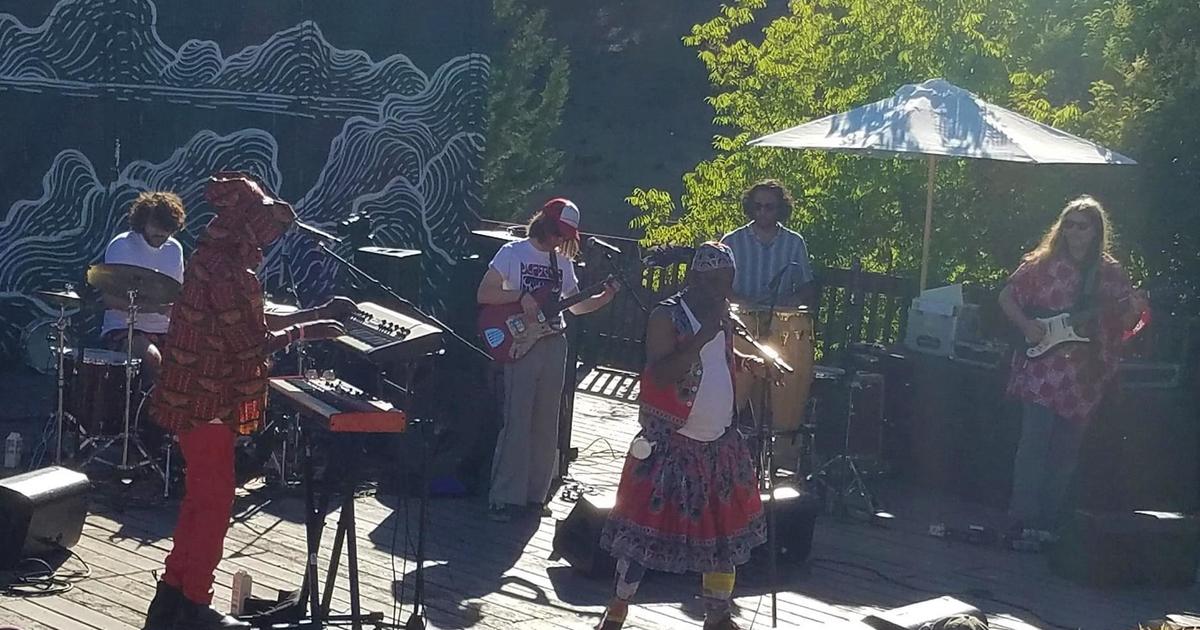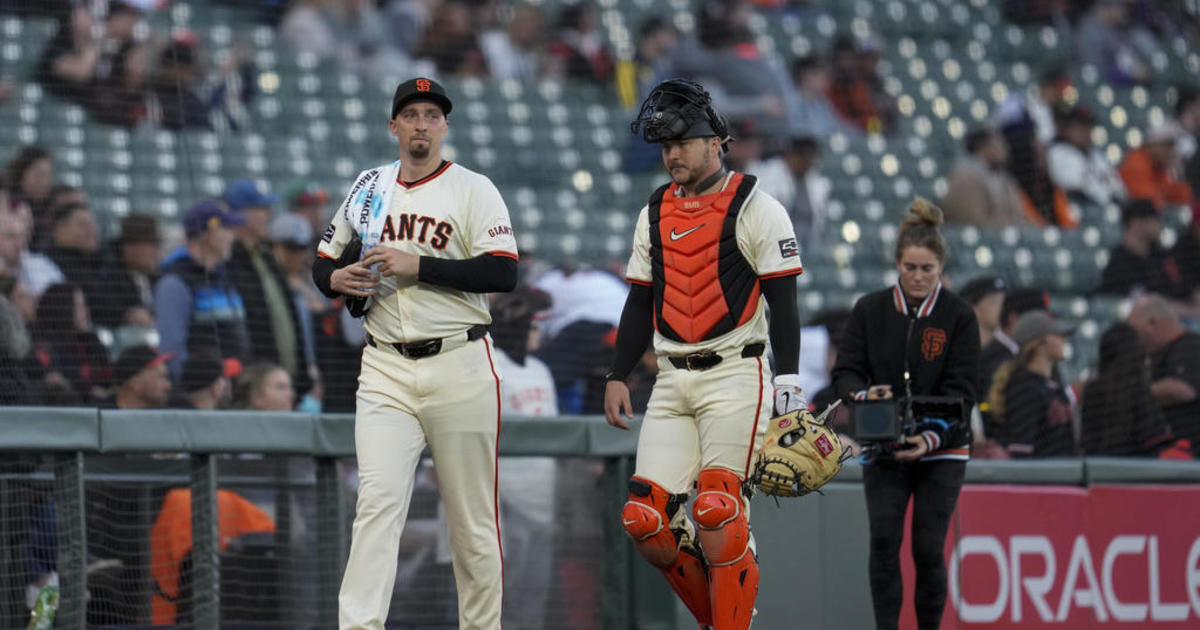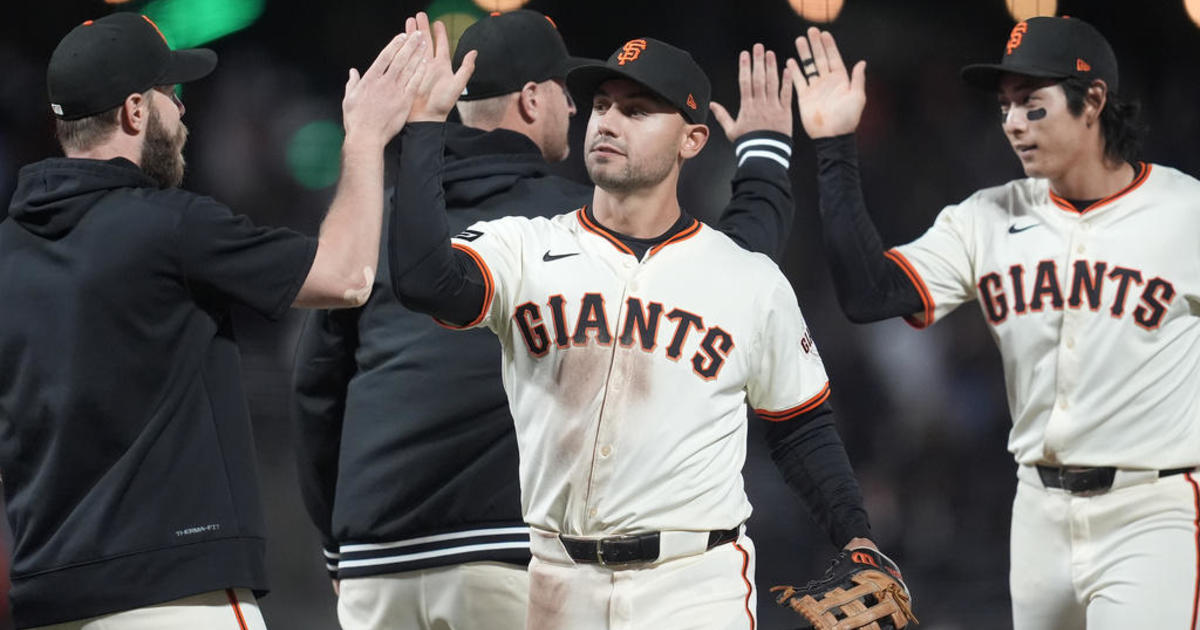CBS SF Talks To Red Fang Bassist Aaron Beam
By Dave Pehling
SAN FRANCISCO (CBS SF) -- Over the course of more than a decade, Portland, OR-based quartet Red Fang has established itself to be one of the most talented, hard-working bands in heavy rock. Since first coming into wider recognition with the release of their eponymous Sergeant House Records debut in 2009 -- and the viral Dungeons-and-Dragons inspired video for "Prehistoric Dog" that featured the beer-shotgunning band clad in 12-pack armor battling wizards (it's been viewed over four million times on YouTube) -- Red Fang has earned a sizable international fan base with its relentless touring schedule.
The band's subsequent albums -- 2011's Murder the Mountains, the band's first for noted metal imprint Relapse Records, and the follow-up effort Whales and Leeches in 2013 -- further solidified the quartet's reputation, though their continued partnership with "Prehistoric Dog" video director Whitey McConnaughy on a run of hilarious clips didn't hurt. The recordings showed the band refining their compelling mix of sledgehammer riffs and hook-laden tag-team vocals of bassist Aaron Beam and guitarist Bryan Giles (second guitarist David Sullivan and drummer John Sherman round out the band). Earlier this year, the group convened to record outside of Portland for the first time, traveling to Ventura in Southern California to work with renowned producer Ross Robinson -- who has helped track albums for everyone from Korn, Limp Bizkit and Slipknot to At The Drive In, Sepultura and the Cure.
The resulting album Only Ghosts came out last month and found Red Fang pushing it's sound in experimental new directions while still pounding out the band's signature blend of heavy riffs and indelible melodies. CBS SF recently spoke with bassist Beam about working with Robinson on the album ahead of the band's upcoming tour to promote the new effort that kicks off in San Francisco at Slim's on November 18 with support from fellow heavy-rock hitmakers Torche and upstart noise-punk outfit Whores.
CBS SF: I will admit a little Korn and Limp Bizkit-related trepidation when I learned about Ross Robinson producing the album, though I know that isn't all he's done. How did you end up working with him and was there a particular album from his discography attracted you to him?
Aaron Beam: In all honesty, I don't pay attention anymore, now that I'm in my 40s. I don't really know what producer has worked on what. Our introduction to him was through our friends' band, Wild Throne. They had worked with him maybe a year or so before we did and loved the experience. They had all kinds of praise for him. And some other friends, Cancer Bats, also recorded with him.
So he kind of came up as an idea through that. It wasn't really about an album we had heard. It was more just about our friends singing his praises and the idea of going out of town to record was really attractive to us as well. It was from word of mouth, basically.
CBS SF: I hadn't really thought about the fact that all of your other albums were recorded in Portland. So his Ventura studio is a place you can actually live at while you work on the album?
Aaron Beam: Yeah, exactly. That was another thing that was really appealing. To make it more of an immersive experience and to get out of town so we wouldn't be distracted by all the normal day-today home life things that I appreciate; but it is also hard to completely commit to what you're doing in the studio when you're distracted by those things.
CBS SF: So how long were you at the studio?
Aaron Beam: We were booked for three weeks, but then we extended it by a week because we knew there was no way we could finish without it. Ross was super generous in that regard, as was Suicide Silence, who were scheduled to start right after we wrapped up. They actually pushed their recording back by a week, very kindly.
CBS SF: Watching some of the studio videos showing the progress on the recording, Ross seems to have brought a real focus to the material and performances he got out of the band. What would you say his greatest contribution was to the album?
Aaron Beam: I think a lot of it was just giving us confidence in ourselves to trust our own instincts and to trust our ability to create on the fly. Sometimes we'd come up with an idea in practice that maybe seemed too challenging, we'd just say 'Instead of wasting everybody's time, let's just move on and maybe I'll work on it at home. But probably not.' And he would give us space to flesh out those sorts of ideas.
CBS SF: I wanted to get into how the process was different for this album with Ross. What I understood from some of the video I saw, in the past you've mostly tracked a lot of the instrumental parts in the studio live, whereas this time all the instruments were individually recorded...
Aaron Beam: Yeah, that's the way they were tracked, but, oddly, the way we recorded the drums was even more live, because we actually had scratch vocals going to whole time too. We kept the scratch vocals in some cases. So when we were doing drums, it was even more like a live performance than it has been before.
CBS SF: That was actually the next part of my question. It sounded like in the past, you've laid down the instrumental foundation without necessarily knowing what the vocal melody or lyrics was going to be, and that all got worked out afterwards. With Ross, you recorded the drums with scratch vocals, so you essentially had to have the songs done. Or at least do the scratch vocals without the finished lyrics...
Aaron Beam: Yeah, we would just repeat stuff, or I had dummy lyrics sometimes. It was much different.
CBS SF: So did that put more pressure on you and Bryan as the main singers and lyricists to have things done quicker?
Aaron Beam: Yeah, for sure. But we knew ahead of time. Going all the way back to when Ross flew up to Portland to meet us, John was talking about how one of his frustrations recording drums in the past was that he'd have no idea what the vocals were going to be. He'd play a drum fill and later realize he was playing right over the chorus. And Ross immediately said, 'Oh that's never going to happen! You have to have the vocals going to whole time, so you're going to know exactly what's going on.'
So at that point, Bryan and I knew and accepted that we were just going to have to have a lot more done vocally before we headed into the studio than we ever had. We were like, 'S--t!' Suddenly, there were two things we had to do. We had to write the songs and figure out our bass part or our guitar part, AND now we had to write the vocal melodies and figure out at least some lyrics. So it made our work load heavier, but ultimately, in the long run, it made everything easier. It was more work up front, but it made shaping the songs and arranging them go faster, because the final piece that you're building around is already there.
CBS SF: The band has employed some interesting textures in past recordings with producer Chris Funk, but it seems like Only Ghosts enters into more experimental song structures and atmospheres with the bridge and coda on "Flies," the middle section of "Cut it Short" and almost dubby part on "No Air." To what extent was that Ross' input?
Aaron Beam: "No Air" was a special case, because that was more or less essentially written in the studio. So it was so compact, that one is kind of hard to say. I can't remember exactly how it happened. As far as those parts in "Cut it Short" and "Flies," those are all parts that we came up with. But it kind of goes back to what I was saying earlier about Ross giving us the confidence to trust our instincts and ideas. They're all things we were already doing in those songs.
For the outro thing on "Flies," there was a little bit more complicated guitar part I had come up with at home. I was like, "There's this other thing, I don't really know how it fits exactly..." And he said, "Just put it on there!" He gave us the leeway to do those things were maybe weren't quite sure about. The idea was don't worry if it make sense, just do it.
So for "Cut it Short," that middle section was already in there, but the end result was more spacious than we would have left it left to our own devices without his input. We probably would have just put a lot more s--t on there so it sounded less spacious. It's a little scary to play that kind of thing live where there's almost nothing going on all of a sudden. We like to fill up all kinds of space all the time. There were spots during the mixing where he would pull guitars out; we had tracked the guitars and he'd say, "Well, let's try this part with no guitars!"
CBS SF: You have a more prominent role instrumentally on some of the songs. There have been Red Fang songs on past albums, but on some of the new material the bass really takes the lead. The way "No Air" and "I Am A Ghost" kick off with a really distorted bass line reminded me a lot of the Jesus Lizard and other AmRep stuff from the '90s...
Aaron Beam: Well, the Jesus Lizard is one of my main influences as far as bass playing goes, so that makes perfect sense. I think there's other songs that have started with bass before, but it seems like from other interviewers and things I've read that people are paying a lot more attention to the bass on this record. I feel like I'm not doing anything that different from the past, so I think a lot of it might just have to with the way the bass sounds. You can hear it better, and the way it's mixed it has more presence than in the past. That's a hard one for me to answer. I don't feel like I'm doing anything that much different. I feel like I have the same basic approach and I dial my amp the same. .
CBS SF: How big of an impact did Joe Baressi have on the sound of the album? Was that the first time you worked with him and how involved where you in the actual mixing process?
Aaron Beam: The last two records we recorded we mixed with Vance Powell, and at least one of us would go and sit with him while the mixing was happening. I think this was the first time any of us have worked with a mixing engineer who was just sending mixes after they were done. Nobody was sitting in the room while it was happening. He had a huge voice in it. His aesthetic and his approach meshed perfectly with what we were looking for.
We had a lot of discussions about general sounds we like and which albums we think sounds good and the general approach we took to recording which influences the way we want the final mixes to sound. And he was just on the same page with us from the beginning. So he would do a mix and send us a WAV or MP3 file and we'd have a certain amount of time to listen and offer feedback. And we're all nerds on our smart phones all the time, so it worked out great.
CBS SF: Red Fang's videos that you've made with Whitey McConnaughy have always been entertaining. I was wondering how you decided on "Shadows" as the song to make the video for and if the Predator concept for it was entirely Whitey's? In past interviews, Bryan had told me you generally put yourselves in Whitey's hands and that it's usually his vision...
Aaron Beam: I'm not entirely sure. Bryan would be able to answer this better. I actually have a vague recollection that Bryan had an idea about us floating in inner tubes down the river and then turning into some sort of Predator-style thing. I think maybe the kernel for that idea came from Bryan. Don't quote me on that, but as far as all the specifics and putting it all together, it was all Whitey again.
We were actually thinking about doing the video for "Cut it Short," but it just wasn't fast paced enough for the storyline of the video as far as what Whitey was thinking. Then he had it all cued for "Not For You," but as he started cutting it together, that song was fast enough either, so he ended up cutting it to "Shadows" instead and it worked way better. Even though "Shadows" had come out in a different form already.
As far as choosing what song to do a video for and what song is going to be a single, on this record from my perspective, it was way harder to choose. There's not really a standout track as there has been on the past records. I feel like this album is more consistent. Not to say that the old albums were a bunch of sh---y songs with one good song. It just feels like this one is much more consistent.
CBS SF: The videos generally have a comedic aspect to them. Do you ever get concerned about meaning or significance of a song being diluted by the video? Have there been songs where you knew you didn't want to have the video attached to it?
Aaron Beam: It hasn't so far. There is a song on the new record that I don't personally want to do a video for, but who knows what will happen with it If somebody comes up with a idea for it. I kind of felt a little bit of that -- just a tiny bit -- for "Wires." But I just love that video so much. Ultimately, it brings more people to your band. The people who want to dig deeper and listen to what the lyrics are actually saying will, and the people who don't, they never were going to anyway. It doesn't really matter that much. I don't think -- given who are and what we look like -- that we every would have been able to get away with a really serious looking video. It would just look like a joke anyway.
CBS SF: This tour is a great bill with Torche and Whores. Did you have past experience with the two bands that led to the tour?
Aaron Beam: We've all been fans of Torche for a long time and we just finished a European tour with them last week. So we just asked them to do both legs. It was super fun. I'm looking forward to it. And Whores. we've actually toured with before. We toured with them and Wild Throne last year. They're a super awesome live band and they're really easy to work with, which is another important thing for us. I agree. Say what you will about us, but I feel like it's a pretty strong bill.
Red Fang plays Slim's in San Francisco on Friday, Nov. 18, at 8 p.m. with Torche and Whores. Tickets are $21
